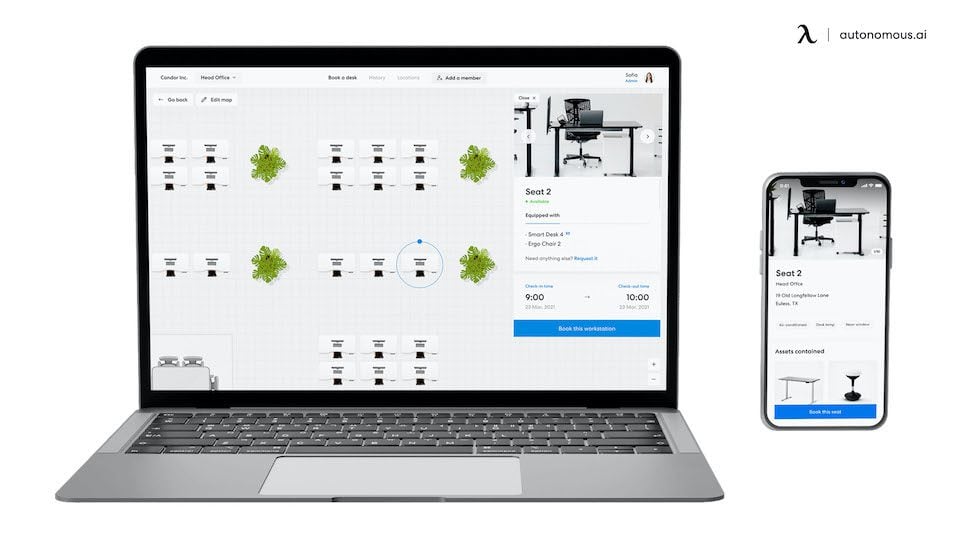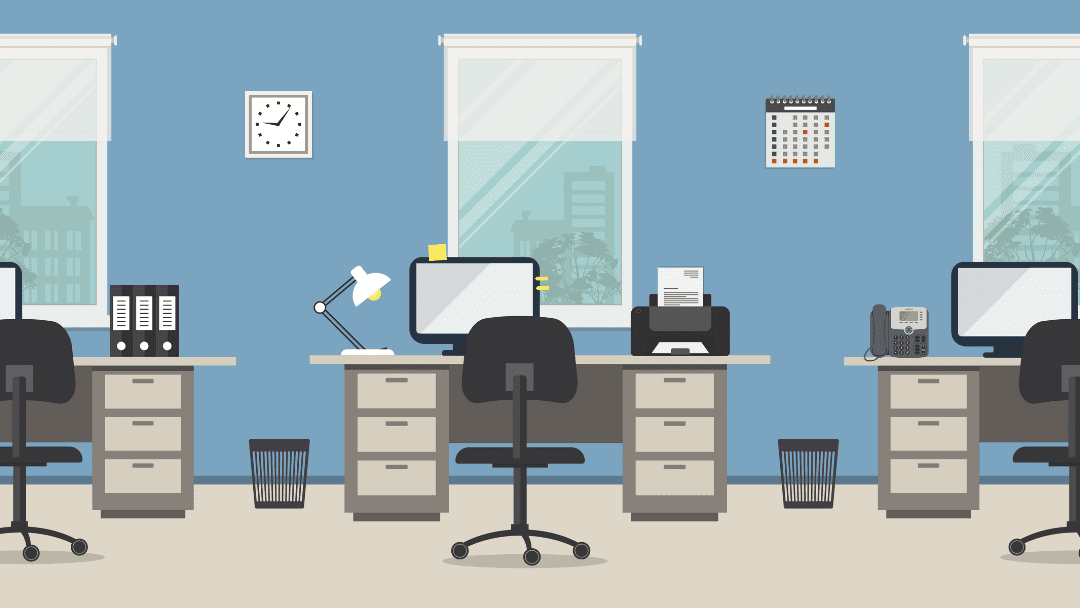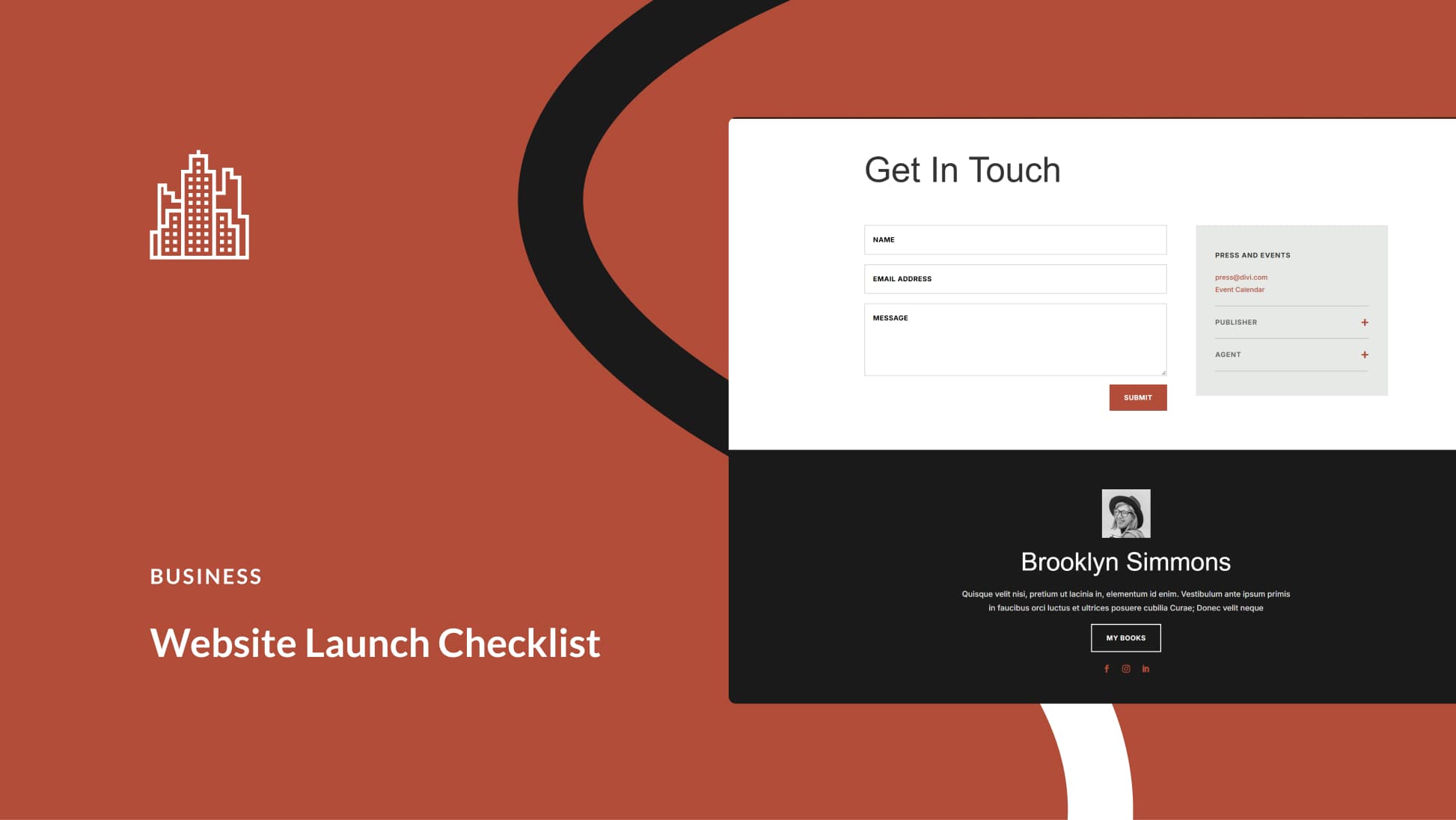The coronavirus pandemic forced practically the whole world to go remote in 2020, and everything from grocery shopping and fitness to date nights and happy hour started occurring within the home instead of outside of it. Work was no different, with companies scrambling to set up employees with access, equipment, and Zoom so businesses could stay afloat when it was too dangerous to be in a public place. But now that some companies are reopening their literal doors, a new problem has arisen. How do you accommodate employees who may — or perhaps more likely, may not — be excited to return to a brick-and-mortar workplace when you no longer have enough real estate for everyone? One solution is desk hoteling, which is a way to create a hybrid workplace with some in-office employees, some remote employees, and the ability to be flexible when it comes to who works where.
What is Desk Hoteling?
Desk hoteling is a space-sharing strategy for the workplace in which employees reserve their workstations ahead of time. It’s one of the ways you can “hotel” your office space. The reservation system functions similarly to how you reserve a hotel room (hence the name). You’ll make your reservation for the desk you want on a specific day and in a specific time slot. When you arrive at work, you’ll check in to say you’re there and that you will be taking over the workstation. Checking in may occur digitally using software or with an actual person. When you’ve wrapped up, you’ll check out to show the station is once again free.

Source: Autonomous
Desk Hoteling vs. Hot Desking
Desk hoteling and hot desking are similar, but there’s one glaring difference: the reservation system. With both strategies, employees don’t have dedicated desks that they work at every day. However, with desk hoteling, workstations are reserved, while with hot desking, workstations are doled out on a first-come, first-served basis. Both also require employees to check-in, but for different reasons. With desk hoteling, check-in claims your space and helps monitor facility capacity, while with hot desking, capacity isn’t as much of an issue as ensuring attendance and workstation occupancy.
Hoteling space means employees have an idea of what their workday will be like before showing up at the office. And if the workstation you want isn’t available, you can decide to work from home that day and go into the office another time. With hot desking, it can feel jarring to arrive at work and end up somewhere you’re not comfortable or productive.
What Kind of Workplace is Desk Hoteling Best For?
Desk hoteling is best for offices that need a lot of control over space utilization. If there aren’t enough desks for everyone, some people will have to work at home every day. Those who will work in-office need a standardized system for figuring out where to work and whether there’s space to do so.
Hot desking, on the other hand, is better for more casual workspaces that don’t have capacity issues. If every single person decides to work in the office on the same day, there will be enough workstations. It’s just a matter of where everyone will sit, not whether or not they can. (Though desk hoteling may still make for happier employees in this case.)
If you decide to move forward with desk hoteling, be open to employee feedback. Regardless of who champions the change and who doesn’t, everyone will have an opinion. Invite critiques and take suggestions to heart. Your employees know better than anyone how office hoteling affects them — and their productivity.
Pros and Cons of a Hoteling Office
Flexible seating arrangements aren’t entirely new. Even pre-COVID, some companies were experimenting with more flexible work arrangements. And as with anything, there are both benefits and drawbacks to hoteling space at the office.
Pro: Customized Workweeks
One of the biggest benefits of desk hoteling for employees is that they can design their week ahead of time and customize where and how they’ll work. Here’s a sample work week:
It’s difficult for Jane to get out the door on time on Monday mornings, so she always opts to work on lighter work and administrative tasks from home. Tuesday through Thursday, she likes to be in the office for more in-depth work. She knows that she can feel stifled and closed in easily, so for two of those three days, she books a desk near a window or schedules collaborative projects in a boardroom. On Friday, she takes the second half of her day back at home so she can start family time ASAP once work is over.
This is just one way that desk hoteling can work with your schedule. And since reservations aren’t recurring, employees can create their week(s) ahead however works best for them. Plus, if you can’t secure the type of workspace or technology you want, you can plan for that, too. Ultimately, employees can have the type of week they need to be productive without getting overwhelmed or burning out.
Con: Poor Office Arrangements
Even though there’s considerably more individual control and planning with desk hoteling than hot desking, it’s still not foolproof. Employees can decide on where to sit and see who they’ll be placed near dependent on who else has secured a seat, but what if some desks are still unbooked? Once an employee arrives at work, they could find themselves sitting next to a colleague that’s not a good match for their work style. For example, if the employee needs quiet to focus on a project, they could end up next to someone who has to take phone calls all day.
To combat this, consider creating zones for different types of work. For example, employees and groups that have to talk a lot for work shouldn’t be near those who need quieter surroundings. You could set limits regarding which employees can reserve space in certain areas, or designate a particular area as a quiet space.
Pro: Flexible Reservations
Desk hoteling isn’t just about picking a desk in a sea of cubicles. There’s a lot more built-in flexibility. For example, employees can:
- Reserve a quiet desk if they have to do intense, focused work.
- Book a desk by a window if they’re more productive with fresh air or sunlight.
- Arrange for a conference room when a collaborative workday is needed.
- Make a reservation for a full day, half a day, or an hour at a time.
- Decide to work in a different office if they’re traveling or prefer one environment over another (for companies with multiple offices in different locations).
Depending on your office’s accommodations, you can offer all sorts of options to workers.
Con: Employee Skepticism
Employees who have had an open workspace in the past, particularly one that utilized hot desking, may be nervous about the change from a traditional setting to office hoteling. For employees who have been back at the office for a while, who are looking forward to their return or who never worked from home in the first place, giving up their cozy, personalized desk can feel like a stab in the back. They may also worry about cleanliness if they’re no longer solely responsible for their workspace.
To get these employees on board, explain your vision and remind everyone of the company’s goals. When you involve workers in your plans, they’re more likely to understand why the change is taking place and support it. It’s easy for the bigger picture to get lost in day-to-day responsibilities, and a refresher about why the brand exists, what everyone is working for and how desk hoteling factors into this can restore priorities. And if cleanliness and sanitariness matter a lot to your team, having the cleaning crew focus more specifically on the workstations can help assuage that concern.
Pro: Dedicated Workspaces
Not every work-from-home employee has an official setup that’s conducive to a successful day of work. For those employees, being able to head into the office some days (or every day) where there’s a desk, a computer, office supplies and, most importantly, quiet is a huge step up from their squeezed-into-a-corner, dog-won’t-stop-barking “home office.”
It also pays to maintain welcoming workspaces. Keep them clean, disinfected, and hospitable. Create a system so desks stay hygienic for each person who reserves space, and add attractive decorative elements, like artwork, plants and sensory relaxation tools.
Part of going to an office every day is working with other people. Having a social life in the workplace helps relieve stress, lets workers bounce ideas off one another, and gives the opportunity to simply enjoy the workday more. With desk hoteling, not only will different colleagues come and go from working in-office throughout the week, but they’ll be sitting in different spaces, which can disrupt the social flow for some (yet improve it for others).
Pro: Physically Distanced Work Areas
Health and safety are top priorities right now (and hopefully forevermore), which makes hoteling workspace setups all the more appealing. Physically distancing work areas means people can feel safer returning to work, and desk hoteling ensures that everyone can protect their health whether they opt to work in the office or are better off at home. Plus, with fewer workstations to clean, a more thorough disinfecting process can be carried out.
Con: New Complications
Any time a process is implemented, there are going to be unforeseen and unfamiliar hiccups. Desk hoteling is no exception. Companies will have to deal with a fresh assortment of issues to troubleshoot, such as:
- Handling special requests, especially when there aren’t enough stations to accommodate every special request at one time. Such as a person who requires a standing desk, but no available workstation is equipped with one.
- Providing the right kind of access to the employee at their workstation.
- Processing cancellations when someone decides not to come to work.
This isn’t to say there aren’t solutions for these problems, just to expect new problems to solve.
Pro: Cost Savings
When companies don’t have to provide work space for every single employee, that can add up to major real estate savings. Whether that desk space is let go of or it’s turned into collaborative or meeting space, the company will likely need less square footage overall. Additionally, if you decide to hire more employees, you can do so without securing more office space.
Also, reducing space is about more than just how much you’re leasing. You’ll also save when it comes to utilities, and there’ll be less space to decorate and furnish. Resources will take longer to dwindle or reach their lifespan, too, as fewer people will be in the office every day using them.
Final Thoughts About Office Hoteling
Desk hoteling has solved the problem of uncertainty that more flexible workspaces created. Yes, employees tend to prefer more options when it comes to where, when and how they work. But they don’t want to wonder if they can work when it’s time to — more specifically, if they can work comfortably in a particular space. With office hoteling, the culture of adaptability is maintained without being dubious.
Have you tried desk hoteling or hot desking? Let’s talk about your experiences in the comments!
Featured image: Iryna Alex via Shutterstock









Leave A Reply